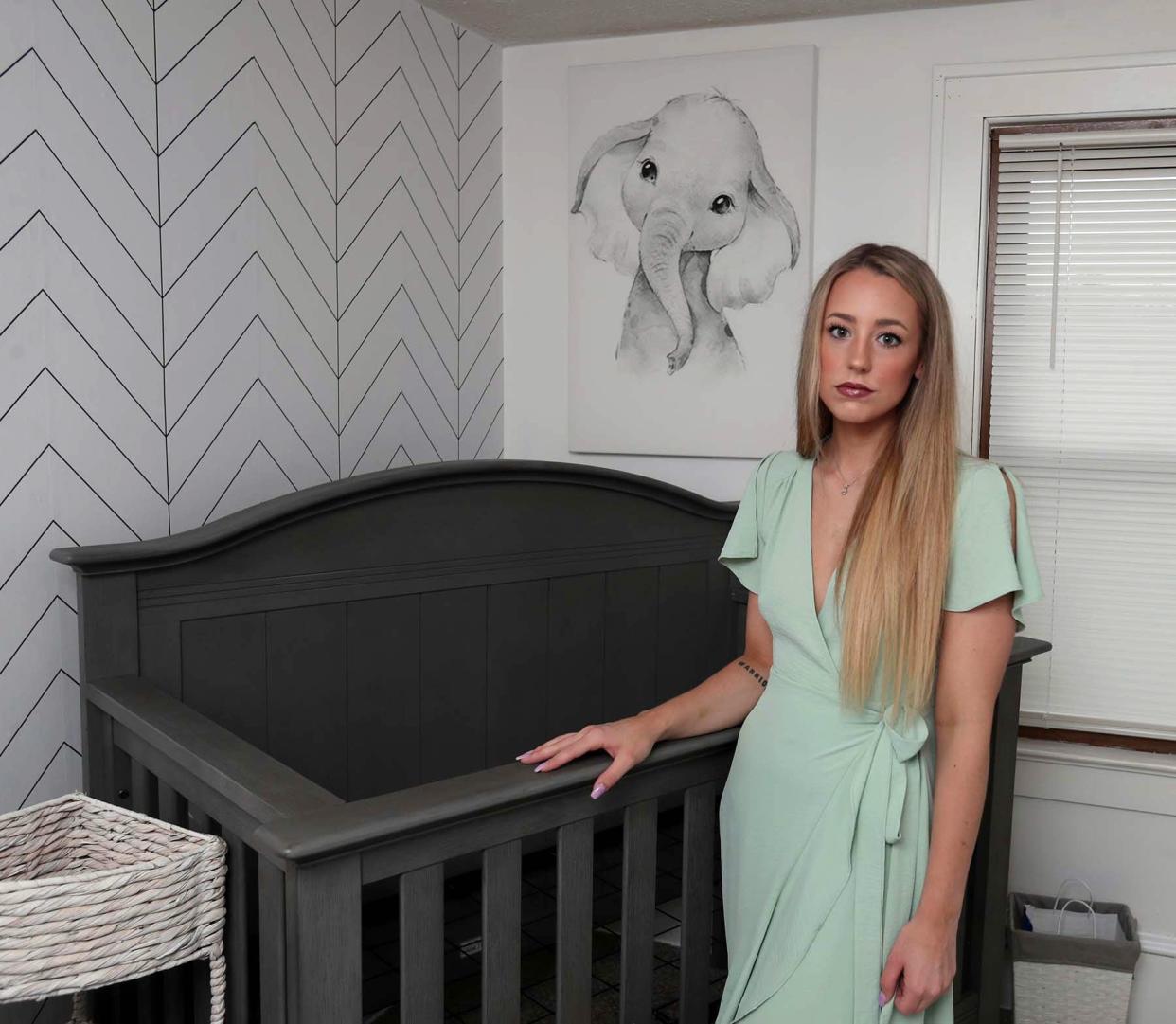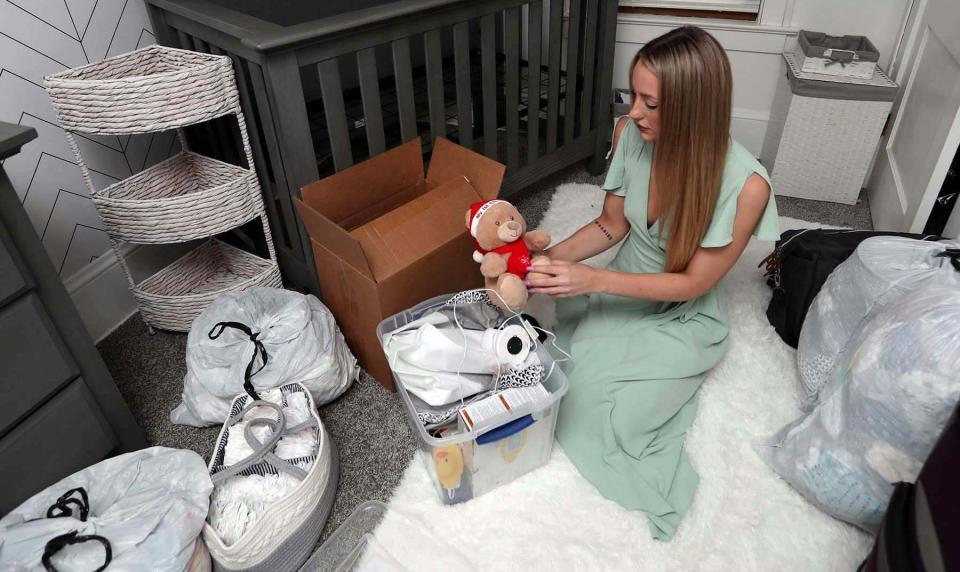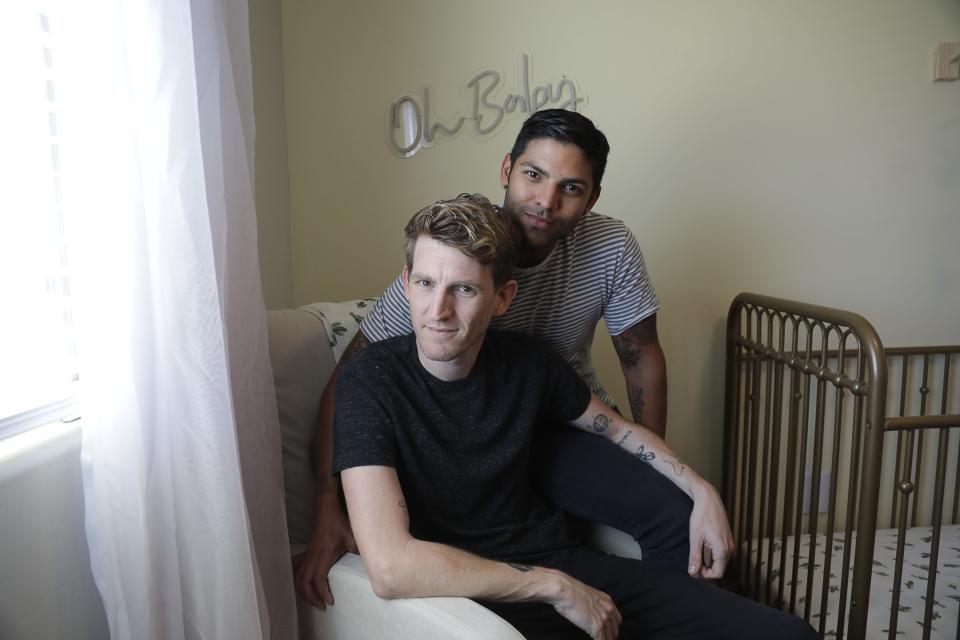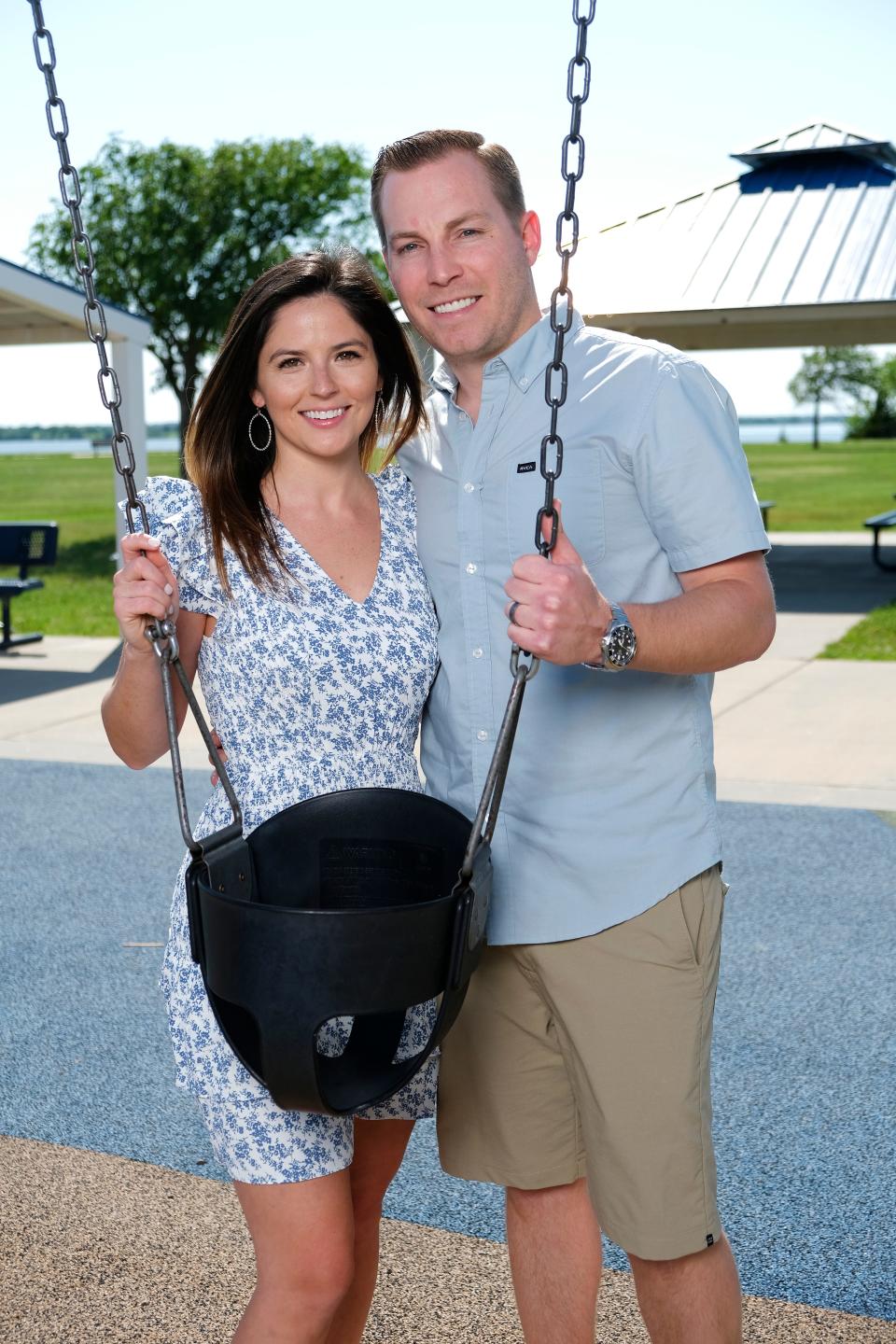Now trending: Instagram adoptions. How social media has influenced the way people adopt kids

Last year on Mother’s Day, Breanne Paquin posted a photo on Instagram holding and kissing her husband with painted letters that read “We’re adopting!” and a caption: "Due date: to be determined."
Paquin, 27, a nurse in Akron, Ohio, lives with chronic illnesses and struggles with endometriosis, which prevents her from getting pregnant. She had a total hysterectomy last year.
She and her husband hoped to use social media to find an expectant mom.
Social media platforms are a relatively new frontier for those seeking to adopt — particularly now that the demand for newborns exceeds the supply. Instagram, Facebook, TikTok and Twitter all are taking on the liaison role traditionally played by adoption agencies.
They also live outside the bounds of most oversight and regulation, which can lead to financial scams, emotional damage and a lack of support services for birth mothers and adoptive families alike.
“It’s still a bit of the Wild West,” said Adam Pertman, president and CEO of the National Center on Adoption and Permanency.
Three months after their initial post, a woman in Texas contacted Paquin and her husband after seeing their Instagram page. They all agreed to move forward with the adoption.
When the couple hired a lawyer to get paperwork in order, the woman’s behavior changed. She would not sign medical release forms or join Zoom calls. She asked the couple to pay for her medical bills but would not sign papers to allow them to pay doctors directly.
The couple kept sending money — close to $9,000 in all — directly to the woman.
It wasn’t until Paquin and her husband flew to Texas on Christmas, car seat in tow, that they realized they had been scammed. Confusing messages from the expectant mother left Paquin in her Airbnb wondering: Was there even a baby at all?

Paquin received one final text from the woman almost one week after they landed: She was keeping the baby.
“Looking back at it now, I wish I would have realized that these were real problems and I was kind of blowing them off,” she said.
Other families described a similar pattern: Create a social media page, wait for a message, get excited when contacted, then experience the frequent letdowns when the person on the other end isn’t who they say they are.
Paquin’s experience illustrates one of the worst possible outcomes. Though experts say scams of this caliber are not common, a lack of oversight and protection for adoptions through social media should cause expectant mothers and adoptive families to proceed with caution.
“The first thing that comes to my mind is how uncharted this territory is, and that to me is very scary,” said Kelsey Vander Vliet Ranyard, director of advocacy and policy at AdoptMatch, a nonprofit that connects birth mothers and adoptive families to licensed professionals.
Vander Vliet Ranyard acknowledged that social media platforms can allow families to cast a wider net in their search but said she has seen people skirting the law.
Mothers place their babies with families who are not qualified to adopt, she said, or did not fill out proper paperwork, or complete a home study — a screening of prospective parents that includes background checks and home inspections. Families make promises they may not keep, such as agreeing to maintain an open adoption, in which the adopted child and birth mom remain in contact.
And most important: There’s often no professional to offer guidance along the way.
“We hear lots of horror stories from adoptive parents who have been through the wringer and have unfortunately learned the hard way about the importance of working with an ethical adoption attorney or agency,” AdoptMatch Co-Founder Celeste Liversidge said. “For expectant moms, pursuing adoption using the internet is very confusing. … It’s very difficult for them to discern between licensed and unlicensed and then, within that orbit, who are the good guys.”
The appeal of social media
Adoption hashtags abound on Instagram, TikTok, Twitter and Facebook, and some are used interchangeably for children and pets.
One hashtag, #AdoptionJourney, appears in more than 380,000 posts on Instagram and on videos with more than 418 million views on TikTok. Posts tagged #AdoptionStory, #AdoptionRocks, #AdoptionDay and #AdoptionIsLove have together accumulated millions of views.
On Twitter, mentions of the hashtag #Adoption have increased 92% in the past five years, according to Zignal Labs, an online tool to analyze social media content. In the same time frame, mentions of the hashtag #HopingToAdopt increased by 76%.
The simplicity — no lengthy review process, no middleman, no upfront fees — can be alluring.
Serita Lachesis, 34, a teacher in suburban Philadelphia, turned to TikTok and started posting in October 2021 to look for an expectant mother. She had tried using her own connections through her personal Facebook and LinkedIn pages and by networking in person.
When Lachesis adopted for the first time, in 2015, she created a profile book about herself that she handed out and emailed to anyone in her circle. She later used a sperm donor to get pregnant with her second daughter.
When she decided to adopt again, she realized the process had changed dramatically.
“I don’t think personal networking is enough anymore,” she said.
‘You don’t give up on family’: Adoptive parents’ quest to help foster daughter meets tragic end
Facebook would have connected her primarily to her own network. A friend recommended she try TikTok. She enlisted the help of a 14-year-old to create an account and started posting videos of her daughters.
“My name is Serita. I am a single mom by choice of two children and I am looking to adopt again,” she said in one video from November, holding a photo of her own family formed through transracial adoption. Lachesis and her brother are biological, but her parents adopted four other children.
Lachesis uses multiple hashtags in her posts to reach expectant moms, including #LookingToAdopt, #TeenPregnancy and #ImWillingToAdoptABaby in addition to #AdoptionIsLove and #AdoptionJourney.
After researching agencies, Matthew and Blake Coelho also chose social media.
They turned to an Instagram page they both used to make their first post related to adoption, which asked for donations to help with adoption costs. They continued to document their journey, sharing when they completed their home study and finished setting up a nursery.

“We are officially #HomeStudyApproved! If you or anyone you know is pregnant and considering #adoption, please think of us,” they wrote in one post.
Matthew, a marketing manager in the hospitality industry, said the couple found that agencies offered tools and techniques they already had.
“If we can utilize our own skills in marketing ourselves and get just as widespread of a reach through social media and save ourselves some of that money so that hopefully we can spoil our future baby, we’d rather do that,” Blake Coelho said.

Costs vary depending on the financial needs of an expectant mother, but a study from the National Council for Adoption estimated that a private, domestic adoption averages $33,100. That included agency charges, paperwork, travel and other fees. Independent adoptions, assisted by attorneys outside the child welfare system, range from $15,000 to $40,000, according to the Child Welfare Information Gateway, part of the U.S. Department of Health and Human Services.
However, CEO and president of the National Council for Adoption, Ryan Hanlon, said he hopes adoptive families aren’t using social media to save money.
“That’s not the area where I’d like to pinch pennies,” Hanlon said. “This is one of the most important things that they're going to do in their lives, and it has an enormous impact on others.”
Help USA TODAY investigate adoption
Are you an adoptee, parent, community member or public and private employee who can help us learn more about adoption issues? We want to hear from you about disrupted and dissolved adoptions.
What happens when a social media adoption goes wrong?
Breanne Paquin decided not to pursue a civil lawsuit after losing nearly $9,000 to the apparent adoption fraud. She said she wanted to avoid spending more time and money on a lawsuit. Her lawyer has been in contact with the county’s district attorney’s office.
“We’re hoping that the justice system would file criminal charges against her, but I honestly don’t see that happening,” she said.
Forty-five states have laws that regulate fees and expenses adoptive parents are allowed to pay to an expectant mother in a private adoption. Commonly allowed expenses include medical and hospital costs, temporary living expenses, counseling fees, legal fees and travel costs for court appearances.
For prospective adoptive families that make an agreement through social media and do not involve attorneys or a licensed agency, there is no built-in oversight of financial arrangements, which makes laws all but unenforceable.
“Are you exchanging money directly between birth and adoptive families? That to me seems extremely unethical,” said Amy Whitesel, an assistant research professor of psychology at George Washington University in Washington, D.C. Whitesel co-authored a report in 2013 studying the internet's impact on adoption.
In Illinois, living expenses can be paid only with court approval or through an adoption agency, according to Illinois adoption attorney Genie Gillespie. She said violating this state law is a Class 4 felony, a category that includes drug possession, aggravated assault and DUI, and can lead to a prison sentence of a year or more.
In similar situations while using a licensed agency, the agency acts as a buffer, often finding ways to handle a problem before the family knows about it, including confirming whether an expectant mom is pregnant.
“We try to protect the families that we work with from getting hurt on both sides because it can really go both ways,” said Janice Goldwater, founder of Adoptions Together, a licensed adoption agency in Maryland, Washington, D.C. and Virginia. In addition to connecting expectant moms and adoptive families, the agency provides post-placement services.
In Louisiana, legislation to expand the state definition of adoption deception introduced by State Rep. Rick Edmonds recently passed the House and Senate and was sent to the governor for approval. The bill would make it a crime for a person to intentionally makes false representations for payments related to adoptions.
The current state definition makes adoption deception a crime only when a birth mom knows she is not pregnant but still requests payments or when a birth mom accepts financial assistance without disclosing that she is receiving support from another prospective family.
But Deb Guston, adoption director at the Academy of Adoption and Assisted Reproduction Attorneys, said attorneys caution prospective adoptive parents that no financial support given to an expectant mother can be conditioned upon her decision of whether or where to place her child.
“We’re not buying and selling babies,” Guston said.
While Paquin said she doesn’t want to discount the right of expectant mothers to change their mind about placing a child for adoption, she is concerned that adoptive parents lack rights when adoptive placements fail.
“If we even just had that basic right where that money would be paid back to adoptive parents if the adoption doesn't go through,” she said, “it would stop people from scamming because it wouldn't be as easy anymore.”
Existing laws fall short
An empty crib has collected dust in a spare room that Meghan and Austin Langlois walked by in their home every day. After six years of struggling with failed fertility treatments, the Virginia Beach couple decided last June that it was time to adopt.
They researched adoption agencies and found them as expensive as the treatments they had just completed, with no greater guarantee of success.
The couple decided to turn to social media, hoping to spend less money and have more control over their search. They launched an Instagram page in November 2021, where they posted photos of their daily lives and linked to their adoption website.
Then came the messages. Pretending to be expectant mothers, scammers sent the couple on an emotional roller-coaster ride.
“It’s up, it’s down, it’s bad. We’ve shared tears, happy tears, sad tears,” Austin said. “With adoption, you’re not in control — you’re at the mercy of someone else, and even more so if you’re trying to do it privately.”

Los Angeles-based adoption attorney David Radis works with more clients each year who use social media to find expectant moms. He’s always watching for signs of problems.
“If it's a red flag, it doesn't mean we stop and don't proceed,” he said. “It means we stop and reanalyze before we proceed.”
Adoption experts say there is a need for more federal oversight of adoption-related laws and more enforcement of existing state laws.
For instance, the Interstate Compact on the Placement of Children, an agreement by all 50 states, includes requirements that must be met during the adoption process when a child is placed out of state.
Illinois Adoption Attorney Genie Gillespie, president of the Academy of Adoption and Assisted Reproduction Attorneys, said the problem is that no entity would be able to find out whether an adoptive family and an expectant mother have enlisted a professional during the process.
Without an attorney or adoption professional, adoption placements may lack the oversight needed to ensure the compact and other legal requirements for an adoption are being followed.
“There’s not really teeth to the interstate compact,” Gillespie said.
The lack of federal oversight and variations in state laws also make it difficult to regulate adoptions, said George Washington University’s Whitesel. One example where state law varies is child advertising laws.
As of 2020, 33 states regulate and limit the use of advertising for adoptive placements, according to the Child Welfare Information Gateway. Eleven states prohibit adoption advertisements placed by any person or organization other than state social services departments or licensed agencies.
None of these laws prevent posts to personal pages on social media platforms because they are not purchased.
“There’s just no federal oversight of how this kind of thing works,” Whitesel said.
Support for birth mothers may be lacking
Often missing in adoptions through social media are professionals to advise expectant moms.
AdoptMatch’s Kelsey Vander Vliet Ranyard said expectant moms can be in crisis and need someone to connect them with local resources for financial, emotional or mental health support before and after the adoption.
“When you go through social media, you are on your own,” she said. “Everyone’s going in blind, so if you don’t have a reliable professional to guide you through that, you are on your own and it can be very scary.”
‘I don’t feel worthy’: The intimate impact of broken adoptions in the US
Hope Baker experienced an unexpected pregnancy almost nine years ago when she was 21, in between her junior and senior years of college. She wanted to hide the pregnancy.
Baker chose to pursue adoption and researched agencies online to decide how to place her child. She felt bombarded with paperwork and pamphlets and did not have a good feeling about placing through an agency.
While searching on Google, she found an ad linking to the profile book of a single mom looking to adopt.
Baker first called the woman’s lawyer and then spoke to the hopeful parent over the phone before flying out to meet her. She lived with the woman for the last two months of her pregnancy.
Once she had spent time with the hopeful mom and got to know her, she felt she couldn’t back out.
“I could have never changed my mind,” she said. “Even if I wanted to, I couldn't have. I could have never hurt her.”
If she were to place a child again, Baker said, she wouldn’t connect with a family on social media without talking to an adoption attorney or an agency she had researched.
“It makes it really, really challenging in my mind for women to make a choice just based on their own feelings and their own emotions,” she said.
Social media success
Despite the cons, prospective adoptive families that use social media do have more control over the search and a wider reach, according to Sharon Dietsche, a social worker and executive director of Embark Behavioral Health, a mental health clinic that works with adopted children.
With agencies, adoptive families are putting all their hope and money into the hands of the organization, she said, where it is often difficult to gauge the work being done to find a baby to adopt. She described how some agencies experience high turnover, and their new hires may be less experienced. Other agencies go out of business, and once they close, families must find another agency and pay new fees, she said.
Using social media “can help you feel better through the process because sometimes, being a prospective adoptive parent, you feel very much in the dark,” said Dietsche, who adopted an older child from India through an international adoption in 2018.
Adoptive parent Jaimie Dorn said she felt private adoption gave her and her husband more control of the process and the ability to get to know expectant mothers better than if she had used an agency. The Long Island couple adopted through social media in 2017.
At first, the thought of making an Instagram post made her queasy. But after having trouble conceiving and failed fertility treatments, the couple decided to adopt.
About 2½ months after first posting on social media, the Dorns received an email from an expectant mother who saw their Instagram page and decided to move forward.
Jaimie attended the birth and cut the umbilical cord for her adopted son, who is now 4 years old. They keep their Instagram page up as a source of inspiration for people looking to adopt through social media.
“We’re really, really fortunate and blessed to have the story that we do,” she said.
A continuing journey
Adoptive families including Breanne Paquin and Meghan and Austin Langlois also hope to one day have their own adoption success story.
An expectant mom contacted Paquin earlier this year to ask her to adopt her baby. Paquin and her husband plan to adopt the child, who is due in June.
After almost reconsidering and turning to an agency, the Langloises have connected through social media with an expectant mom who is also due in June.

The couple has met her, attended a doctor's appointment and is working with lawyers.
“We want to celebrate what we’re doing and make someone else’s life better and hopefully find a kid that needs a home and make that kid’s life better,” Austin said.
Meghan said the scariest part of the process is waiting, knowing that the expectant mother can change her mind at any point.
“There’s just nothing protecting us, which is the nature of adoption anyway,” Meghan said. “The waiting game is hard.”
Rachel Looker is a USA TODAY Washington Watchdog Fellow and pursuing her master's degree at American University.
More in this series
‘A broken system’ leaves tens of thousands of adoptees without families, homes
This article originally appeared on USA TODAY: How Instagram, TikTok, Facebook are used in newborn adoptions

